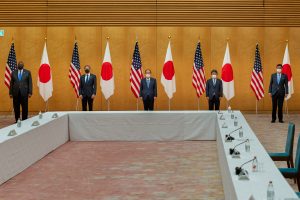The foreign and defense ministers of Japan and the United States wrapped up a high profile “2+2” dialogue in Tokyo, which focused mainly on containing the rise of China through an “unwavering” U.S.-Japan alliance. In an unusual move, both governments singled out China and expressed “serious concerns” over its maritime assertiveness and the human rights situation in Hong Kong and the Xinjiang Uyghur Autonomous Region.
Both governments renewed their commitment to a free and open Indo-Pacific. In a subsequent joint statement they agreed to “oppose actions that undermine a rules based international order and any one-sided action that attempts to change the status quo.” Japan and the United States labelled China’s behavior as “inconsistent” with the existing international order and said it poses political, economic, military, and technological challenges to the U.S.-Japan alliance.
The meeting comes at a time when Japan’s administration of the disputed Senkaku Islands in the East China Sea faces pressure from China’s growing naval activity in Japanese waters. Japan expressed a sense of crisis over China’s regular patrolling around the islands, which are called the Diaoyu in China. China’s new maritime policing law, which allows the coast guard to use force in Chinese-claimed waters, has prompted fears of escalating encounters between China and Japan. A Japanese spokesperson stressed, “There’s no doubt China is coming to take the Senkaku islands and Japan alone will lose.” With Chinese vessels becoming regular visitors around the disputed islands, Japan remains poised to work with the United States to curb China’s maritime expansion.
At a press conference after the discussions, U.S. Secretary of State Antony Blinken emphasized the importance of “peaceful problem solving” but warned that “we will respond when China takes hardline measures.” By the same token the latest joint document not only referenced the new maritime policing law as “inviting confusion” but also highlighted that the U.S. and Japan “will oppose any one-sided actions that would undermine Japan’s administration of the Senkaku Islands.” The previous 2+2 joint statement in 2019 did not explicitly name China as a threat; however, in early March Blinken called China the “biggest geopolitical test in the 21st century.”
The United States stressed an unwavering commitment to defend Japan and the application of Article 5 of the Japan-U.S. Security Treaty, which stipulates that the United States will assist Japan in case of attack. U.S. official have been clear that the guarantee also applies to the Senkaku Islands. Japan also pledged to strengthen national defense and improve its capacity to bolster the alliance. The ministers also stated that the current regional security situation reiterates the need for bilateral and multilateral training exercises to enhance the alliance’s responsiveness and deterrence to keep China in check. The cost of covering the U.S. forces in Japan after the current arrangement expires in 2022 is expected to be negotiated in the summer and it’s likely Washington will ask Tokyo for a larger contribution.
This is the first 2+2 meeting under the Suga and Biden administrations and it also marks the first overseas ministerial trip since President Joe Biden’s inauguration two months ago. The security talks are a much welcomed signal of the Biden administration’s East Asian foreign policy strategy, given the Trump administration’s threats to remove U.S. military forces from Japan and impose tariffs on Japanese steel and aluminum. Blinken stressed, “It is no coincidence that the Biden administration has chosen Japan as its first overseas destination.”
Both governments called the meeting a good opportunity to cooperate and take the lead in regional affairs, including responding to the spread of COVID-19 and climate change. China’s recent changes to Hong Kong’s electoral system, restoring democracy in Myanmar, and the denuclearization of North Korea were also discussed. Both ministers agreed to hold another 2+2 later in the year.

































